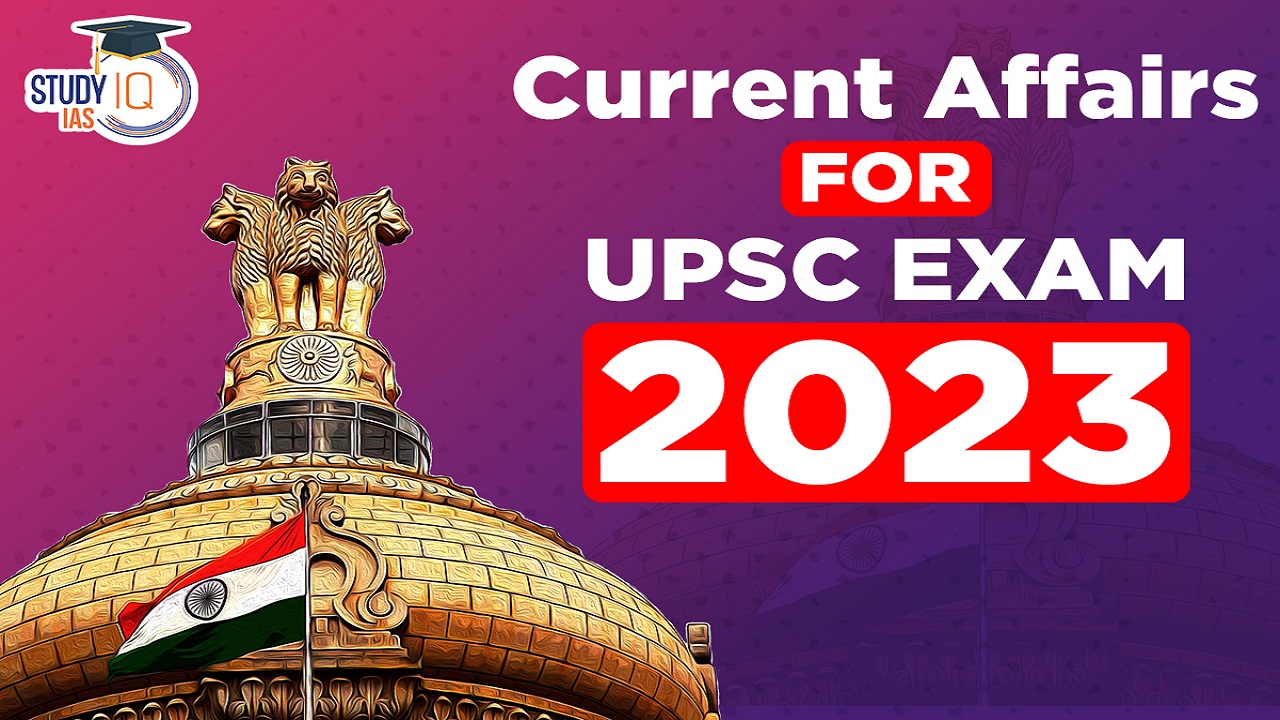Current Affairs 27th July 2023 for UPSC Prelims Exam
Zero Hour
Context: Tamil Nadu Assembly Speaker informed Madras High Court that the ‘zero hour’ of assembly sessions cannot be telecasted live unless all party leaders assure that only the subject concerned will be discussed.
About the Zero Hour
- Zero Hour is the time when Members of Legislatures can raise Issues of Urgent Public Importance.
- It starts immediately after the question hour and lasts until the agenda for the day (i.e., regular business of the House) is taken up.
- In other words, the time gap between the question hour and the agenda is known as zero hour.
- The first hour of every sitting during a Parliament Session is called the Question Hour.
- The Difference between Zero Hour and Question Hour is the Ministers are not bound to reply in the Zero Hour.
- Nature: ‘Zero Hour’ is not mentioned in the Rules of Procedure. Thus, it is an informal device available to MPs to raise matters without any notice 10 days in advance.
- Origin: Zero Hour is an Indian parliamentary innovation.
- The concept of Zero Hour started organically in the first decade of Indian Parliament, when MPs felt the need for raising important constituency and national issues.
- During the initial days, Parliament used to break for lunch at 1 pm. Therefore, the opportunity for MPs to raise national issues without an advance notice became available at 12 pm and could last for an hour until the House adjourned for lunch.
- This led to the hour being popularly referred to as Zero Hour and the issues being raised during this time as Zero Hour submissions.
- Requirements: For raising matters during the Zero Hour, MPs must give the notice before 10 am to the Speaker/ Chairman on the day of the sitting.
- The notice must state the subject they wish to raise in the House.
- However, Speaker, Lok Sabha / Chairman, Rajya Sabha may allow or decline a Member to raise a matter of importance.
Current Affairs 26th July 2023 for UPSC Prelims Exam
Financial Action Task Force (FATF)
Context: The Government has urged Supreme Court to allow the ED chief to stay in post till October, citing FATF review.
About Financial Action Task Force (FATF)
- Definition: FATF is an inter-governmental body that has developed standards to prevent and combat money laundering and terror financing.
- It was established in 1989 during the G7 Summit in Paris to develop policies against money laundering.
- Objective: To establish international standards, and to develop and promote policies, both at national and international levels, to combat money laundering and the financing of terrorism.
- In 2001 its mandate expanded to include terrorism financing.
- Headquarters: Paris, France.
- Members: FATF members include 37 countries, including the United States, India, China, Saudi Arabia, UK, Germany, France.
- India became a member of FATF in 2010.
- FATF Lists:
- Black List: Countries knowns as Non-Cooperative Countries or Territories (NCCTs) are put on the blacklist. These countries support terror funding and money laundering activities. The FATF revises the blacklist regularly, adding or deleting entries.
- Three countries North Korea, Iran, and Myanmar are currently in FATF’s blacklist.
- Grey List: Countries that are considered a safe haven for supporting terror funding and money laundering are put on the FATF grey list. This inclusion serves as a warning to the country that it may enter the blacklist.
- Black List: Countries knowns as Non-Cooperative Countries or Territories (NCCTs) are put on the blacklist. These countries support terror funding and money laundering activities. The FATF revises the blacklist regularly, adding or deleting entries.
- Effects of being on the FATF Blacklist:
- No financial help is given to them by the International Monetary Fund (IMF), the World Bank, the Asian Development Bank (ADB) and the European Union (EU).
- They also face a number of international economic and financial restrictions and sanctions.
Parliamentary Privileges
Context: Congress president and Leader of the Opposition in the Rajya Sabha complained that his microphone was turned off during his address and claimed it as a breach of his parliamentary privilege.
About Parliamentary Privilege
- Parliamentary Privilege: Parliamentary privilege refers to rights and immunities enjoyed by Parliament as an institution and MPs in their individual capacity, without which they cannot discharge their functions as entrusted upon them by the Constitution.
- So far, neither Parliament nor any State legislature has enacted a legislation that defines the powers, privileges and immunities of the Houses, or that of its members and committees.
- These immunities are presently governed by British parliamentary conventions.
- Origination: The Government of India Act, 1935 first brought this provision to India, with references to the powers and privileges enjoyed by the House of Commons in Britain.
- Constitutional Provisions: Article 105 of the Constitution deals with “powers, privileges of the Houses of Parliament and of the members and committees. Article 194 extends analogous protection to a member of the Legislature of every State.
- Privileges:
- Freedom of Speech: Freedom of speech in Parliament is subject to the provisions of the Constitution and the rules regulating the procedure of the Houses.
- A member is exempt from legal action for anything said or vote given in Parliament or one of its committees.
- Article 121 of the Constitution restricts members from discussing the conduct of the judges of the Supreme Court and the High Court.
- Freedom from Arrest: A member has immunity from arrest and “service of legal process” within the precincts of the House without prior permission from the Chairman or Speaker.
- An MP can’t be arrested in a civil case, 40 days before the commencement of the session or a committee meeting, and 40 days after its conclusion.
- However, this privilege is limited to civil cases.
- An MP doesn’t enjoy any immunity against action in a criminal case, during the session or otherwise.
- Parliament, however, reserves the right to receive immediate information of the arrest, detention, conviction, imprisonment and release of a member.
- Validity of any proceeding of Parliament can’t be inquired into by a court on the grounds of alleged irregularity of procedure, as per the provisions of Article 122.
- Right to Prohibit the Publication of Proceedings: No person shall be held liable for publishing any reports, discussions etc. of the House under the authority of the member of the House.
- Extension to Non-Members: Provisions that apply to MPs also extend to non-members (such as the Attorney General for India) those who have the right to speak and take part in proceedings or parliament committees, by virtue of the Constitution.
- Freedom of Speech: Freedom of speech in Parliament is subject to the provisions of the Constitution and the rules regulating the procedure of the Houses.
What is Breach of Privilege?
- If an individual or authority disregards or undermines a parliamentary privilege of a member or the House, it is called a ‘breach of privilege’. The offence is punishable.
- A member of the House can raise a question involving a breach of privilege with the consent of the Chairman or Speaker.
- Parliament is the sole authority to ascertain if there has been a breach of privilege or contempt of the House, no court is entrusted with this power.
- The authority to decide the punishment lies with the House. A person found guilty of breach of privileges or contempt can be reprimanded, warned or sent to prison.
- The period for which the House can commit an offender to custody or prison for contempt is limited to the duration of the session of the House.
- In case its member is found guilty, the MP can be suspended from the House or face expulsion.
No Confidence Motion
Context: Lok Sabha Speaker has accepted a no-confidence motion moved against the ruling government by the Opposition.
About No Confidence Motion
- Definition: In the Indian parliamentary system, a motion of no-confidence plays a crucial role in assessing the government’s strength and accountability.
- Process: In a parliamentary democracy, a government can be in power only if it commands a majority in the directly elected House.
- Article 75(3) of our Constitution embodies this rule by specifying that the Council of Ministers are collectively responsible to the Lok Sabha. But the Constitution of India does not mention about either a Confidence or a No Confidence Motion.
- For testing this collective responsibility, the rules of Lok Sabha provide a particular mechanism – a motion of no-confidence.
- Any Lok Sabha MP, who can garner the support of 50 colleagues, can, at any point of time, introduce a motion of no-confidence against the Council of Ministers.
- Thereafter, a discussion on the motion takes place.
- MPs who support the motion highlight the government’s shortcomings, and the Treasury Benches respond to the issues they raise.
- Finally, a vote takes place – in case the motion carries, the government is bound to vacate the office.
- A no confidence motion can only be moved in the Lok Sabha.
- History: It was during the third Lok Sabha in 1963 that the first motion of no confidence was moved by Acharya J B Kripalani against the government headed by Prime Minister Jawaharlal Nehru.
- The debate on the motion lasted for 21 hours over four days, with 40 MPs participating.
- Use: The no confidence motion has historically been used as a strategic tool to force a discussion on a certain topic or issue.
- The Opposition knows that it does not have the numbers but still has moved the motion to force the government to address their concerns about the situation in Manipur.
Fast Radio Bursts
Context: Astronomers find new clue about mysterious radio flashes called Fast Radio Bursts in space.
About Fast Radio Bursts (FRBs)
- Fast radio bursts (FRBs) are super intense, millisecond-long bursts of radio waves produced by unidentified sources in the deep space.
- Their discovery in 2007 by American astronomer Duncan Lorimer led to the term ‘Lorimer Bursts’.
- Since then, just a few dozen similar events have been observed in data collected by radio telescopes around the world.
- Origin of FRBs: The origin of FRBs remains a major unsolved puzzle in astronomy. Various theories have been proposed, but the exact cause of these bursts is yet to be determined.
- Recent research suggested that some FRBs originate from magnetars, which are neutron stars with extremely powerful magnetic fields.
- Characteristics of FRBs:
- Duration: FRBs are extremely short-lived, typically lasting only a few milliseconds.
- Radio Waves: Unlike gamma-ray bursts (GRBs), which emit gamma-ray radiation, FRBs are characterized by their emission of radio waves in the electromagnetic spectrum.
- Intensity: FRBs are incredibly bright, with a luminosity equivalent to hundreds of millions of times the output of our Sun.
- Dispersion Measure: It is one of the defining features of FRBs. As radio waves travel through space, they encounter free electrons that cause them to disperse or spread out.
About Gamma-ray Bursts (GRBs)
- Gamma-ray bursts are short-lived, intense bursts of gamma-ray radiation, the most energetic form of electromagnetic radiation.
- They are among the most energetic events in the universe and can release more energy in a few seconds than our Sun will emit in its entire lifetime.
- Types of GRBs:
- Long GRBs: Last several seconds to minutes and are associated with the collapse of massive stars (supernovae) or the merger of neutron stars.
- Short GRBs: Last only a fraction of a second to a few seconds and are associated with the merger of neutron stars or a neutron star with a black hole.



 Serious Fraud Investigation Office (SFIO...
Serious Fraud Investigation Office (SFIO...
 Article 142 of Indian Constitution, Sign...
Article 142 of Indian Constitution, Sign...
 Pakistan-Occupied Kashmir (PoK): History...
Pakistan-Occupied Kashmir (PoK): History...





















